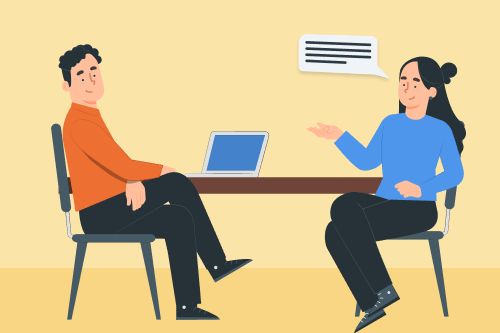“What’s a reason you wouldn’t hire me?” This question was casually dropped at the end of a job interview, and it sounds like something out of a book of job hacks or a casual flex of ultimate confidence. A tweet with this exact question went viral on X (formerly Twitter), racking up more than 151,000 likes. The post triggered debates across corners of the Internet.
Why the hype?
This question got this much attention because it flips the traditional job interview script that everyone is used to. Instead of the candidate being under a microscope, things change. The candidate now takes back a bit of power, revealing self-awareness, a hunger to improve, and, in some cases, intentionally putting the recruiter on the spot.
Let’s rewind a little.
According to what we all know, or at least what we are used to, job interviews usually follow one predictable formula: The company asks the questions, and the candidate or interviewee provides the answers. The company pokes, prods, and questions while the interviewee smiles, performs, and hopes they say the right thing and give perfect answers.

But then comes the twist. The candidate drops a bombshell.
“Is there any reason you wouldn’t hire me?”
At that moment, everything changes. The interviewer pauses, and their eyebrows go up. They start thinking fast and scrambling for an answer.
This is the Uno-Reverse moment—the moment when the candidate shifts from being a passive interviewee to a confident equal in the conversation. Whether it is a gutsy or genius move depends on how and when they play it.
But here is the catch: timing is everything, just like with a real Uno reverse card. As a candidate in an interview, ask this question too early, and you will come off as aggressive. Ask the wrong person, and you will risk leaving a bad impression. But when you ask it at the right moment, you might unlock the feedback that will help you land the role, get you an even better position, or help prepare you for the following interview.
In this article, we will explain how and when to deploy the Uno-Reverse interview question without sabotaging your chances. We will also discuss how you can turn this bold move into a strategic career advantage.
What Is the “Uno-Reverse” Interview Question?
The phrase “Uno-Reverse” is the internet slang for flipping a situation on someone unexpectedly, like dropping a spicy counter question in an interview. The exact question usually sounds this way:
“Is there anything about my experience or this conversation that would make you hesitant to move forward with me?”
Or, more directly:
“What would be a reason you wouldn’t hire me?”
This question catches some hiring managers off guard. However, for the right ones, the question shows confidence, emotional intelligence, and a willingness to take feedback. These three traits stand out in a sea of polished, overly rehearsed answers provided by candidates.

Why This Question Works
When executed in the right way, the Uno-Reverse question serves three primary purposes, which are:
- It shows courage and coachability. It shows that you are not afraid of hearing critique as a candidate. Instead, you are asking for it. This is rare, and recruiters notice.
- As a candidate or interviewee, this question gives you live, actionable insight. Suppose something is bothering the interviewer, maybe something you’ve said or how you’ve answered specific questions. With the Uno-Reverse question, you will allow them to clarify or course-correct before making their final decisions.
- It flips the script respectfully. Rather than ending with a passive traditional question like, “Do you have any questions for us?” Using the Uno-Reverse question as an answer to that question, instead of saying just yes or no, will pique and show genuine interest from both sides.
When To Ask the Question
Timing matters. In the real game, you wouldn’t drop an Uno-Reverse card before the dealer hands out the cards, would you? The same thing applies here. The best time to ask this question is:
- At the end of the interview, after you have built rapport and discussed the role in detail.
- When the interviewer asks, “Do you have any questions for us?
- During the final round of conversation, not during the initial screenings or recruiter chats,
This makes the question feel like a mature reflection, not a trick or daring challenge.
Who To Ask
While some people will appreciate your directness, others might freeze. That is why you need to read the room.
When you are in the room with the following people, you can direct your questions to them:
- Hiring managers
- Team leads
- Senior decision-makers
- Interviewers who have had a warm, open tone throughout the interview.
On the other hand, it can be risky to ask the following people:
- Junior HR reps
- External recruiters
- Interviewers who seem rushed, engaged, or overly formal.
If you are unsure, you can soften the language.

Dos and Don’ts
Let’s imagine interview scenarios where we will show what you should and shouldn’t do with the Uno-Reverse question during an interview.
What You Should Do: Ask in A 1:1 Final Round
Scenario: You are in a 45-minute video call with the Head of Marketing. You have had a great back-and-forth, and the conversation is winding down. Then you say:
“I would appreciate your feedback. Based on our conversation, is there anything you would suggest I improve or be aware of before moving forward?”
This shows that you are open to growth and invites constructive insights.
What You Should Not Do: Ask During a First-Round Screening
Scenario: You are on a 15-minute introduction call with a junior recruiter who is checking boxes. You say:
“So, is there any reason you would hire me?
This might cause an awkward silence. The recruiter is not equipped to evaluate or answer meaningfully. The question might feel confrontational and premature.
What You Should Do: Reframe the Question Like You Want Feedback
Scenario: You are at the end of a panel interview.
You say:
“I value opportunities to grow. Based on our conversation today, is there anything I could improve?”
This sounds humble, curious, and professional.
What You Should Not Do: Ask the Question Too Abruptly
Scenario: The interview is ending, and you suddenly blurt out:
“Is there any reason why you wouldn’t hire me?”
This might throw the interviewer off guard. The question in this scenario lacks context and tact.
How To Prepare for Whatever Answer You Get
Asking a bold question means you need to be ready for real answers. If the interviewer mentions a concern after the question, do not panic. Instead, try the following responses. Even if you do not get the job, this feedback can help you for the next interview:
- Clarify: As an interviewee, you can say, “Thanks for sharing that. I would love you to give more context if it helps.”
- Acknowledge: You can say, “That is fair. I appreciate the honest feedback, and I will reflect on it.”
- Respond Strategically: You can respond by saying, “I understand how that came across. In similar roles, here is how I have overcome that…”
Turning the Moment Into an Advantage
As an interviewee, by flipping the script, you get feedback and subtly interview the interviewer. How they respond will tell you a lot. For example:
- Do they respect bold and growth-minded candidates?
- Are they transparent and kind under pressure?
- Do they care about your success or just want you to fill a role?
While a great answer might help you get the role you applied for, a bad one might signal to you to leave a seemingly bad or toxic work environment.
Summary
The “Uno-Reverse” interview question is not a hack. It is a tool, an innovative way for you to stand out. Using it at the right time and in the right way can show that you are confident, curious, and thoughtful. However, like any power move, how and when you use it is more important than just trying to surprise someone, in this case, your interviewer.
